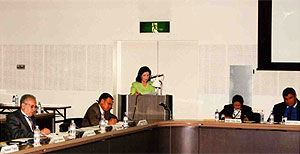A MoFA Japan-UNU Seminar
"People Building Peace"
- Human Resource Development in Asia for Peacebuilding -
Day-1 Opening Remarks by Vice-Minister Professor Yamanaka

August 28,2006
Ambassador Brahimi,
Sir Marrack Goulding,
Distinguished guests,
Ladies and gentlemen,
Let me extend my heartfelt gratitude to all of you here who have gathered to join this Seminar on "People Building Human Resource Development in Asia for Peace-building."
At the outset, let me briefly explain the reason why we organized this seminar and what is expected from it. The landscape of peace-building is ever-changing. The time is ripe for reviewing our efforts in order to respond to new challenges. We see a newly established UN Peace-building Commission, which is to explore further an integrated approach to peace-building to achieve sustainable peace.
In Asia, ASEAN countries envision a road map for three pillars of its community vision, including ASEAN Security Community. Against such background, Japan would like to take lead in human resource development in Asia for peace-building.
Foreign Minister Taro Aso first raised this issue in his policy speech on Asia in December last year and will make a strong commitment at his policy speech specifically on this matter tomorrow. We would like to make most of this seminar to kick off our initiative and deepen our knowledge on this matter from the collective wisdom of you all.
Nevertheless, this is just an initial step.
We wish that, starting from this seminar, we would continue to keep in touch with each other and to be engaged in human resource development in Asia for peacebuilding in various forms.
Your support and cooperation in the future are indispensable for the success for this important initiative.
As for the specific issues for discussion in this seminar, we would like to focus on the following points:
- What kind of qualifications and expertise do peacebuilders need to acquire?
- In order to develop such peace-builders, who can tackle with the globally-shared agenda of peace and security, how should we promote cooperation and networking in human resource development rather than leaving this matter to individual efforts?
Next, let me brief you on the reason we will focus on human resource development in Asia this time.
Needless to say, peace-building should cover a wide range of phases from postwar humanitarian support and reconstruction to nation-building, and thus it requires longstanding efforts. Efforts to rebuild government functions need to cover a wide range of issues, such as election management, rule of law, taxation, local government, etc. Besides, Japan has been advocating the importance of human security, with strong emphasis on community protection and empowerment. This approach would be most useful in such post-conflict situations. Having pursued nation-building with the support from the international community, Asian people have the ability to seek further peace and prosperity by refining their capacity already developed through their own experience. Such capacity will multiply the benefit the world can enjoy if it is also directed towards peace-building outside Asia.
Refining our expertise on peace-building will be a robust pillar of regional cooperation aiming at deeper integration, confidence-building and stable and sustainable regional prosperity. The agenda of developing human resources, especially civilian peace-builders, is yet to be addressed in Asia. We believe this attempt will produce immeasurable positive effects on regional cooperation and welfare. Regional approach can provide substantial contribution to global efforts, including the UN Peace-building Commission. Asian unique experiences and skills of nation-building might provide unique solutions to the world. Asia might learn new prescriptions from international pioneers in other regions. Asian talent will grow into an asset with high capacities of universal applicability. Forming a network of such human resources will produce a more viable option in promoting development, security, and prosperity for the brighter future of Asian community as well as the world community.
Asia can become more vocal and proactive in addressing the theme of peace-building and coexistence with the world. I believe Asia possesses abundant experience and expertise enough to support the development in other regions, but such an endeavor has not been fully explored. The Government of Japan is ready to take a lead. We will make steady efforts to promote a regional as well as global human network that would foster initiatives and activities in developing peace-builders, especially civilians.
We hope that more and more potential Asian peace-builders with trained skills will "go to the people" on site in the near future to meet for needs of natural disasters like Tsunami etc. as well as man-caused disasters.
To this end, the effective recommendations out of our intensive discussions during the two-day seminar will be most welcomed.
I thank you.
Back to Index
